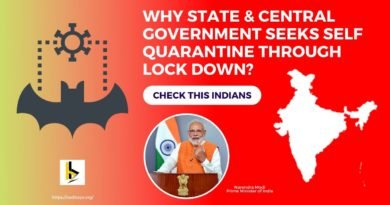University of Hyderabad faculty develops potential vaccine candidates for COVID19
|
You can listen to the article here.
|
NOTE: This is a sincere notice to the public to maintain the #SocialDistancing & other measures imposed by respective state & central governments of #India until the finally tested & approved vaccine is announced by authorities. This is not a vaccine but these candidates provide a cost-and-time-effective framework for rapid experimental trials towards an effective nCoV vaccine
Until then, every thing is a theory only. Please #StayHomeStaySafe
The #Coronavirus is the pandemic & spreading at a fast pace of more than 6 lakh cases & you know it took around 3 days for the infection to spread from 4lakhs to 5 lakhs and it took aroud 1 day to move from 5-6 lakh infected people across the globe. Worls need immediate action, else the world may end soon. In this scenario, where the intelligent & technologically advanced countries have nothing much left to do except for seeking help from others, countries with less area & high population i.e., India needs more care. While our government is doing its part & other countries as well trying their best to be strong, India & Indians need your support for the accelerating its fight against COVID19.
Here is the reason why the government is imposing lock down despite people's interest for their own good.
In case you need to know more about the data how #COVID19 is taking over the world, just go and watch this LIVE DASHBOARD.
What's The Potential Vaccine Candidates:
Dr. Seema Mishra, faculty at University of Hyderabad, has designed potential vaccine candidates, called T cell epitopes, against all structural and non-structural proteins of novel coronavirus (2019-nCoV) for experimental testing.
These vaccine candidates are small coronaviral peptides which are used by cells to trigger an immune response to destroy cells harbouring the viral peptides.
Using powerful immunoinformatics approaches with computational softwares, Dr Seema Mishra has designed these potential epitopes in a way that can be used to vaccinate an entire population.
Usually, vaccine discovery takes 1.5 years, but the powerful computational tools helped in quickly enlisting these vaccine candidates in about 10 days.
A ranked list of potential candidate vaccines, based on how effectively they will be used by human cells to stop the virus, has been generated. With no matches present in human protein pool, these coronaviral epitopes pose no cross-reactivity to human cells and hence, the immune response will be against viral proteins and not human proteins. However, these results have to be investigated experimentally in order to provide conclusive evidence.
These results have been disseminated to the scientific community using ChemRxiv preprint platform for urgent experimental assays. Acknowledging that currently social distancing remains the best defence against nCov infections, the UoH stated that vaccination will take some time as further work is needed on the candidate epitopes.
"We are hopeful that our computational findings will provide a cost-and-time-effective framework for rapid experimental trials towards an effective nCoV vaccine," the statement said.
The University of Hyderabad clarified that although the research has been disseminated, the scientific community, in vitro studies are required to be conducted for establishing the findings conclusively.




